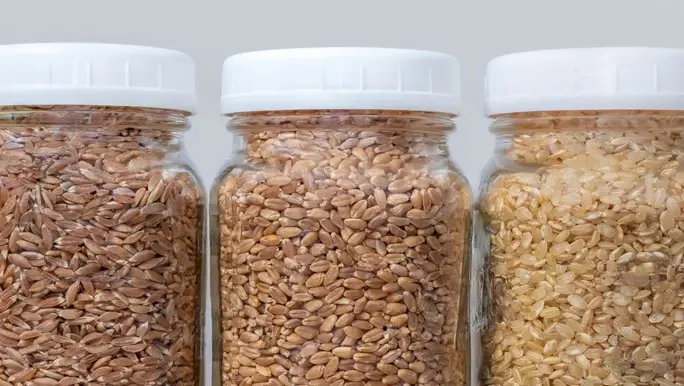Wholegrains vs. refined grains: What’s the difference?

Are you looking to take your pantry staples to the next level? A typical Australian pantry tends to include a lot of grain foods, so let’s focus on getting the most from our grains.
Many of the grain foods we have in the cupboard can be classified as ultra-processed foods, that is foods that undergo several industrial processes, contain additives and emulsifiers and include little, if any, wholefoods in the final product.

Are you ultra-sure you know what ultra-processed food is?
To make the right choices, you need the facts. Find out what processed food is and choose the right foods for you.
Ultra-processed foods are generally high in kilojoules, added salt, sugar and saturated fat and low in fibre, protein and other important nutrients.
The ultra-processed foods we find in the pantry such as refined breakfast cereals, potato chips, biscuits and crackers generally have a long shelf life and are generally marketed for convenience, not health.
The case for grains
Grain foods are not the enemy, but the types of grain foods we choose to eat are important. When it comes to grains, wholegrains are the key. The Australian Dietary Guidelines recommends that at least two-thirds of the grain foods we eat should be wholegrain.
But what exactly is a wholegrain? Wholegrains contain all three layers of the grain – the germ, the endosperm and the bran layer and have more fibre, vitamins, minerals and antioxidants than refined grains.
When grains are refined to make white flour or rice for example, some of these layers are removed and several nutrients are lost in processing. Many are added back by manufacturers like folate and fibre, but some of the beneficial nutrients like phytochemicals are lost.
Choosing more wholegrain foods to eat as part of your pantry staples can increase the amount of fibre you consume.


The perks of a well-stocked pantry
Do you often find yourself staring vacantly into the pantry and struggling to decide on something to eat? Here are 5 reasons to keep it well-stocked.
Fibre not only aids digestion and keeps us feeling fuller for longer, but increasing our fibre intake may reduce our risk of diseases such as heart disease and type two diabetes. Most Australians don’t consume enough fibre. The recommendation for adults is 25-30g of fibre each day. This can be achieved by eating more fruits and vegetables, choosing wholegrain products over refined grains and limiting our intake of ultra-processed foods.
Wholegrain foods also contain prebiotic fibre. Prebiotics are the non-digestible fibres and resistant starches found in plant foods, that feed the good bacteria in your gut. These fibres are fermented in your gut and create compounds called short-chain fatty acids, which support the immune system and help regulate hormones that affect metabolism and mood.
Swapping out your pantry staples to include more wholegrain foods can reduce our intake of salt, sugar and saturated fats found in many refined, ultra-processed foods. Eating more wholegrain foods can also increase our nutrient intake, including fibre to support our gut and digestive health, support our immune system and improve our mood - Winning!
Get to know the balance of your shop
Check out the Healthylife Food Tracker - a simple tool to help inspire you to make healthier food choices and achieve a more balanced diet
A simple tool to provide insight into your shopping habits and inspiration to make healthier choices
Nutrition Australia is Australia’s leading nutrition non-profit organisation, providing information, education and business-to-business (B2B) consultation and advisory services to help Australians achieve optimal health through good nutrition.
Reviewed by the Healthylife Advisory Board March 2022
This article is for informational purposes only and does not provide medical advice, diagnosis, or treatment. Any information published on this website or by this brand is not intended as a substitute for medical advice. If you have any concerns or questions about your health you should consult with a health professional.